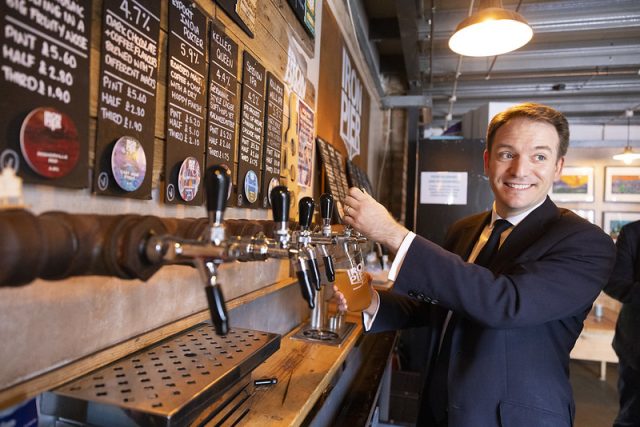Wine is ‘biggest loser’ of today’s alcohol duty changes
By Eloise FeildenWine is “probably the biggest loser” of today’s alcohol duty reforms, Eloise Feilden hears, speaking exclusively to MPs and industry executives on the biggest tax hike the industry has faced since 1981.

Gareth Davies, exchequer to the treasury, spoke exclusively to Eloise Feilden on site at Iron Pier brewery in Kent yesterday, saying that “the overarching purpose of the reform is to ensure that we have consistency and a very simplified process compared to what we had before”.
Alcohol duty reforms, the biggest change to the system in 140 years, come into effect from today (1 August 2023).
To find out what you need to know about the details of the alcohol duty reforms click here.
Conservative Party MP Gareth Davies told db that the aim of the new reforms was to “tie it to our public health objectives, which is really important for the Government”.
“It is well documented the public health benefits of a lower alcohol intake, and the higher alcohol content in drinks, the more damage that could do to your health,” he said.
However, the exchequer to the treasury also said the Government is “supportive of all sectors”.
“We want to support what is a really important part of not just our economy, but our society,” he said. “We as a country enjoy alcoholic drinks, and we want to make sure that they can continue to do so at a reasonable rate, while balancing fiscal responsibility.”

Barry Watts, SIBA head of public affairs, said the changes coming into effect today are “the most fundamental change to the alcohol duty system in generations”, and warned that “it is going to have a long term impact on what we see on the bar, and what consumers see on the shelves”.
One positive outcome to the new reforms comes in the form of Draught Duty Relief, which will see pubs benefit from lower alcohol tax on drinks served on tap. Indeed, the duty paid on drinks on tap in pubs will be up to 11p lower than at the supermarket, the Government has said.
“Draft duty relief is a game changer for the sector,” Watts said. “It means for the first time there’s a different rate that can be applied to pubs, and over time, I think that’s really going to help get people off their sofas back onto the barstools.”
Watts predicts a growth in the cider category as a result of the changes, as well as some made wine products like Mead served on tap. Ready-to-drink products from the spirits sector will also benefit from Small Producers Relief for the first time, and the Treasury has estimated that cans of 5% ABV ready-to-drink spirit mixers will see prices drop by 6p.
Lower-ABV drinks are also set to benefit. Davies told db: “The basic principle is that the stronger the alcohol, the more duty you pay. What we’re very keen to see is businesses capture the market trend that we’re already seeing in terms of increased demand for low alcohol content products.”
Partner Content
There will be lower taxes on lower alcohol products – particularly for those below 3.5% ABV in strength.
However, SIBA’s Watts warned that the new system creates a split between the “winners and losers” in the drinks trade.
For beer, The Government has also increased relief for products with an ABV up to 8.5%, meaning “there’s a growth area now for those Double IPAs between 7.5% and 8.5%”.
However, Watts also predicts that we will see more global brands reducing their ABV to benefit from the lower duty rate below 3.5%, meaning more price competition with independent British breweries.

The new system also means that “anything above 8.5% is much more expensive”, Watts said. “So there really is an incentive not to make some of those Imperial stouts, those strong double IPAs around 10%, and so we might lose out on some of those innovative products.”
Administrative challenges will hit small businesses in light of the reforms. “From a smaller brewer’s perspective, obviously it is a bit more complicated,” Watts said. “It’s now turning into a personalised system,” he explained, where what businesses pay “is very much based on exactly what the brewery is producing but also how strong their products are, which means an additional step for them to do.”
Watts also called wine “probably the biggest loser out of the changes”. From today, the price of a sparkling wine with an ABV of 10% will be reduced by 4%, but the price of a fortified wine at 22% ABV will go up by 58%, meaning the disparity between products is stark.
He suggested that if wine producers can start creating “fizzy Prosecco” at approximately 8.5% and serve them on draft, “they can start benefitting from all the changes”.
The UK Spirits Alliance has also called the hike in duty, the biggest since 1981, a “bitter blow” to the UK’s struggling hospitality and spirits industry. “It is yet another cost piled upon pubs, consumers, and spirits makers across the UK.”
The reforms were first announced at the Autumn Budget in 2021, but their implementation has been delayed until now.
When asked to respond to Beale’s claims of crippling tariffs, Davies said: “I think four out of the five last fiscal events have seen duty on wine either cut or frozen. Now we’re seeing this new system implemented, which is simpler and more consistent, which will see some alcohol products have their duty increased and some decreased.”
“In some instances, wine will go up and in some instances, wine will go down,” the exchequer to the treasury said. “We continue to support all small businesses, and that includes wine producers. But these reforms have at its heart the objective of making it much simpler, much more consistent, and very easy to understand that the higher the alcohol, the more duty paid.”
Related news
Should Rioja increase its focus on white wine?
The 'family spirit' behind Champagne Gardet's 130th anniversary




